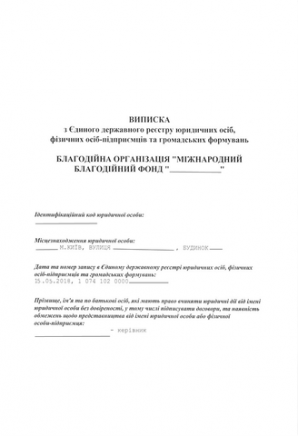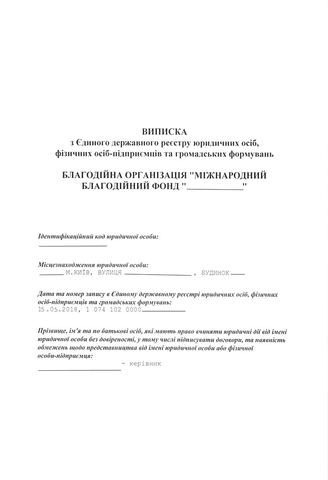Import and taxation of car imports by non-profit organizations in Ukraine
Cost of services:
Reviews of our Clients
Nowadays, Ukrainian non-profit organizations have a plethora of opportunities to secure grants for their operations, particularly if they offer assistance to the Ukrainian Armed Forces (UAF) either partially or entirely.
In the past year, we've witnessed a significant influx of imported vehicles by Ukrainian non-profit organizations. However, regrettably, this process often faces unnecessary delays. The primary culprits are improper documentation and incomplete information.
In this article, we will delve into the different methods available for non-profit organizations to import vehicles, the protocols for transferring them to third parties, and the essential paperwork involved.
Moreover, an important consideration when choosing an import method is taxation. We will provide a more comprehensive breakdown of the tax implications for each case as we proceed.
You may also like: Cash Transactions in Nonprofit Organizations
Purchasing a vehicle for a Ukrainian non-profit organization
If a non-profit organization in Ukraine plans to acquire a vehicle for various purposes such as providing support to the military or facilitating humanitarian aid transportation, it has the full right to do so.
When purchasing a vehicle, there are important factors to consider:
- Ensuring that the intended use of the vehicle aligns with the organization's mission and objectives.
- Verifying that the organization has the necessary funds allocated specifically for the vehicle purchase.
The process of acquiring a vehicle typically involves the following steps:
1) Decision-making and documentation.
The organization formally documents the decision to purchase a vehicle through an official order or resolution, allocating the necessary funds.
2) Vehicle search and establishing a relationship with the seller
The organization enters into contractual arrangements with the seller. This is done through signing a Sales Agreement or a similar contract.
Please note! If the vehicle is being purchased from abroad, the contract should:
- Be prepared in both Ukrainian and the seller's language (or English).
- Include essential details such as the vehicle's country of origin, delivery terms, and timelines.
- Be duly signed by the seller, and include scanned copies of the seller's technical passport and registration documents.
3) Payment and transaction completion.
Please note! In the case of purchasing a vehicle from abroad and making payments in foreign currency, the bank may require the following documents:
- Purchase agreement
- Invoice
- Letter explaining the purpose of the vehicle acquisition
- Letter providing additional information related to the foreign trade contract
- Letter regarding delivery arrangements
Please note: Prior to making the payment, our specialists will coordinate the document package with the bank. Bank representatives may ask additional questions or request further information.
4) Organizing the vehicle's transportation to Ukraine.
Delivery arrangements are made according to the terms specified in the purchase agreement. The completion of the delivery is confirmed through the signing of a Delivery Acceptance Certificate.
Note: When importing a vehicle, the customs declaration serves as proof of crossing the customs border.
5) Registering the vehicle at the Ministry of Internal Affairs Service Center (in the case of acquiring a vehicle for direct use by the non-profit organization).
Note: During times of war, all legal entities acquiring ownership rights to vehicles are required to provide information about the vehicles to the Territorial Center of Control and Accounting and the State Fiscal Service.
6) Including the vehicle in the non-profit organization's balance sheet in Ukraine (in the case of acquiring a vehicle for direct use by the non-profit organization).
If the non-profit organization has purchased a vehicle for its own use, it must record the acquisition in its accounting records and include the vehicle in its balance sheet.
The necessary documents for including the vehicle in the non-profit organization's balance sheet are as follows:
- Delivery Acceptance Certificate
- Order for putting the vehicle into operation
- Customs declaration (in the case of vehicle importation).
Please note! Registering a vehicle in Ukraine involves considering the contractual value (for purchases within Ukraine) or the customs value (for imported vehicles).
7) Transferring the Vehicle to the Ukrainian Armed Forces (for vehicles acquired with the intention of subsequent transfer to a military unit or servicemen).
When transferring the purchased vehicle to a military unit, the procedure includes completing a Transfer Acceptance Certificate while simultaneously transferring the vehicle to an off-balance account.
The transfer of the vehicle requires the following documentation:
- A letter of request from the military unit or a charitable assistance agreement with a combatant.
- Transfer Acceptance Certificate.
- Order for the vehicle transfer.
You may also like: Accounting and Reporting Requirements for Charitable Foundations in Ukraine
Taxation of vehicle acquisition in Ukraine
When it comes to purchasing vehicles in Ukraine, the taxation process for buying from local suppliers is much simpler compared to importing vehicles.
If a non-profit organization buys a vehicle from a legal entity, including individual entrepreneurs based in Ukraine, there are no additional taxes involved.
The non-profit organization simply pays according to the purchase agreement and includes the vehicle's cost on its balance sheet at the agreed value.
However, when purchasing from an individual, the non-profit organization acts as a tax agent and is responsible for withholding and remitting the personal income tax taxes (PIT) based on the agreed value.
Please note! When an individual sells a commercial vehicle:
- For the first and second sale within the reporting year, the income from such a sale is subject to a 5% PIT and 1.5% military duty.
- If the third and subsequent commercial vehicles are sold within a year, the income from those sales is subject to a tax rate of 18% PIT and 1.5% military duty.
When an individual sells a passenger car:
- For the first sale, the income is not subject to PIT or military duty.
- For the second sale within the reporting year, the income is subject to a 5% PIT and 1.5% military duty.
- If the third and subsequent passenger cars are sold within a year, the income from those sales is subject to a tax rate of 18% PIT and 1.5% military duty.
Let's say the contractual value of a vehicle is 50,000 UAH. If the non-profit organization is purchasing from an individual who has already sold two vehicles within the year, they would deduct 5% PIT and 1.5% military duty from the 50,000 UAH. The remaining amount of 46,750 UAH is then remitted to the individual after these taxes are withheld.
You may also like: How to Open a Bank Account for a Charitable Foundation in Ukraine?
Taxation of cross-border vehicle acquisition
When purchasing a car from a foreign legal entity, including individual entrepreneurs, outside of Ukraine, non-profit organizations are subject to several taxes upon crossing the customs border:
- Customs Duty: % of customs duty varies based on the engine capacity, country of import, and year of manufacture of the vehicle.
- Excise Tax: % is determined by the engine capacity and year of manufacture of the vehicle.
- Value Added Tax (VAT): 20% based on the agreed purchase price of the vehicle.
- Pension Fund Contribution during the initial registration: % depends on the vehicle's value if it is brand new.
If the car is purchased from a foreign individual, the non-profit organization acts as a tax agent for PIT and Military Duty.
The foreign individual's income is subject to an 18% PIT and 1.5% Military Fee.
The non-profit organization deducts these taxes from the payment to the foreign individual.
Is it possible to optimize tax payments during customs clearance?
Tax preferences and exemptions for customs clearance are only applicable to goods and property categorized as humanitarian aid.
It's important to note that humanitarian aid refers to targeted charitable assistance.
If you intend to purchase a vehicle for subsequent transfer to the military, you must have a letter of request/inquiry from the military unit and an order confirming the organization's acquisition of the vehicle for subsequent transfer to the beneficiary (military unit). These documents will qualify the vehicle as humanitarian aid and facilitate a simplified customs clearance procedure.
You may also like: Conditions for Applying Preferences on Importing Goods from the EU to Ukraine
Restrictions on acquiring a vehicle for the operational needs of a non-profit charitable foundation
It's worth noting that non-profit charitable foundation’s administrative expenses cannot exceed 20% of the foundation's total income. This calculation includes all types of income received, including targeted funds, general contributions, and passive income.
Administrative expenses of the foundation encompass various elements, such as:
- Salaries and associated taxes for employees.
- Rental costs and utility expenses for the foundation's premises.
- Communication services, including internet and telecommunications.
- Banking services utilized by the foundation.
- Depreciation of essential assets employed in administrative functions.
- Other services directly linked to the foundation's operational activities.
It's important to bear in mind that if a purchased vehicle isn't used to directly support the foundation's core objectives, such as transporting humanitarian aid or facilitating program-related tasks, there is a risk that the vehicle's depreciation may be classified as part of the administrative expenses.
Additionally, exceeding the 20% threshold for depreciation expenses compared to the foundation's income (total funds received) may result in potential repercussions, including the loss of non-profit status and the transition to the general taxation system, subjecting the foundation to a corporate income tax rate of 18%.
You may also like: Contract and Act: How to Document the Receipt of Charitable Assistance in Foundation's Records?
Importing vehicles as humanitarian aid to Ukraine
Your organization or foundation serves as an intermediary between a donor willing to donate a vehicle for charitable purposes and a military unit that is ready to receive the assistance. In this case, the transfer of the vehicle is formalized as humanitarian aid.
The process involves the following stages:
1) Initiating the offer from the donor to provide a vehicle.
As a non-profit organization, you need to receive a letter from the donor (in any format) expressing their willingness to donate the vehicle free of charge.
2) Obtaining the consent and commitment of the military unit to accept the vehicle as humanitarian aid.
Please note! A non-profit organization cannot receive a vehicle as humanitarian aid without a designated recipient. Therefore, it is crucial to promptly identify a beneficiary and obtain a letter (in any format) from them, confirming their willingness to accept the vehicle.
3) Making a decision within the non-profit organization to proceed with acquiring the vehicle for the intended beneficiary (military unit) as humanitarian aid.
This stage is confirmed by issuing an internal order.
4) Formalizing the donation or gratuitous transfer of the vehicle by the donor.
Please note! When formalizing the donation or transfer, it is essential to include the following information:
- Alignment of the agreement with the non-profit organization's objectives.
- The ultimate beneficiary (the military unit receiving the vehicle).
- Conditions of the transfer as a charitable contribution.
- Details of the vehicle transfer process (delivery, customs procedures, etc.).
- Comprehensive vehicle information (VIN, model, make, year of production, country of origin, condition).
Including the above information helps provide a clear understanding of the agreement and minimizes potential inquiries or issues from customs and tax authorities.
5) Organizing the transportation of the vehicle.
The logistics of delivery are arranged according to the terms specified in the donation or charitable transfer agreement.
In the case of importing the vehicle, a customs declaration is processed upon crossing the customs border, confirming its recognition as humanitarian aid.
6) Registering the vehicle at the Ministry of Internal Affairs (MIA) Service Center.
Currently, vehicles imported as humanitarian aid are granted temporary registration.
Please note! The temporary registration certificate and the prepared Acceptance and Transfer Act (between the non-profit organization and the military unit) serve as evidence of the appropriate use of humanitarian aid.
7) Including the vehicle on the non-profit organization's balance sheet.
The acceptance process involves:
- The Acceptance and Transfer Act for the vehicle.
- The internal order to put the vehicle into operation.
- The customs declaration (if the vehicle was imported).
Please note! The vehicle is recorded on the non-profit organization's balance sheet at the agreed-upon value (if acquired within Ukraine) or the customs value (if imported).
Vehicles that are immediately transferred to the ultimate beneficiary are accounted for off-balance sheet within the non-profit organization.
You may also like: Establishing Relationships Between a Charitable Foundation, Employees, and Volunteers
Taxation of vehicle acquisition as humanitarian assistance
According to the current legislation, certain operations related to receiving vehicles as humanitarian aid are exempt from taxation:
- Importing vehicles into Ukraine as humanitarian assistance, including their entry into the customs territory of Ukraine.
- Operations involving the acceptance and transfer of vehicles within Ukraine as humanitarian assistance.
An important condition for tax exemption is the proper utilization of vehicles in accordance with the concept of humanitarian aid.
We have previously discussed the repercussions of misusing humanitarian assistance here.
Importing vehicles as charitable aid
We have already covered the topic of purchasing and importing vehicles as humanitarian aid. However, there is an alternative method to acquire a vehicle, which is through charitable assistance.
For instance, if your organization or foundation provides goods as humanitarian aid to individuals affected by the war, and you require a vehicle for transporting the aid, you may have found a donor willing to donate a vehicle to you free of charge. How can you correctly formalize the receipt of this assistance?
The process involves the following steps:
1) Initiating a request from the donor to provide a vehicle.
As a non-profit organization, you need to receive a letter from the donor (in any format) offering to donate the vehicle without any cost.
2) Formalizing the donation or gratuitous transfer of the vehicle by the donor.
Please note! When formalizing the donation or transfer, it is crucial to include the following information:
- Alignment of the agreement with the non-profit organization's objectives.
- Conditions of the transfer as a charitable contribution.
- Details regarding the vehicle transfer process (delivery, crossing the customs border, etc.).
- Vehicle information (VIN number, model, make, year of production, country of origin, condition).
Including the above information helps ensure clarity regarding the agreement and reduces the likelihood of inquiries or issues from customs and tax authorities.
3) Organizing the transportation of the vehicle
Logistics for delivery are arranged based on the terms specified in the donation or charitable transfer agreement.
In the case of importing the vehicle, a customs declaration is processed when crossing the customs border.
4) Registering the vehicle at the Ministry of Internal Affairs (MIA) Service Center.
Note: During times of war, all legal entities acquiring ownership rights to vehicles must provide information about them to the Territorial Community Council and the Service Center.
5) Recording the vehicle on the organization's inventory.
The acceptance process involves:
- The Acceptance and Transfer Act for the vehicle.
- The internal order to put the vehicle into operation.
- The customs declaration (if the vehicle was imported).
Please note! The vehicle is recorded on the organization's inventory at the agreed-upon value (if acquired within Ukraine) or the customs value (if imported).
You may also like: Registration of Humanitarian and Charitable Assistance in the Charitable Foundation's Records
Taxation of vehicle acquisition as charitable assistance
Unlike humanitarian aid, importing vehicles as charitable assistance is not exempt from taxation. Therefore, non-profit organizations must go through the customs clearance process and fulfill tax obligations similar to those applied to purchasing vehicles from abroad. The applicable taxes include:
- Customs duty: % depends on the engine capacity, country of import, and year of manufacture of the vehicle.
- Excise tax: % is based on the engine capacity and year of manufacture of the vehicle.
- Value Added Tax (VAT): A 20% tax is applied to the agreed-upon value of the vehicle.
- Pension fund contribution during initial registration: % depends on the value of the vehicle if it is brand new.
For non-profit organizations, especially charitable foundations, receiving vehicles as charitable assistance for their own needs comes with a limitation on administrative expenses, which should not exceed 20%. We have discussed these limitations previously.
Importing vehicles is just one of the regular operations non-profit organizations conduct in Ukraine. It is essential to have a comprehensive understanding of how to carry out such operations, the required documentation, and where to submit reports each time.
We offer a straightforward solution - entrusting the management and formalization of these operations to experienced accountants and lawyers at Pravova Dopomoga Law Firm.
Today, we provide our services to non-profit organizations actively involved in their activities and who wish to concentrate on their core mission.
Our services include:
- Consultations on taxation for charities and beneficiaries.
- HR and accounting services for charitable organizations.
- Immigration consultations and document acquisition (work permits, residence permits).
- Legal support for fundraising mechanisms.
- Development of contracts and provision of written and oral consultations on the application of Ukrainian legislation.
You can find the cost of support for charitable foundations here.
You can find the cost of support for non-governmental organizations here.
Our clients







